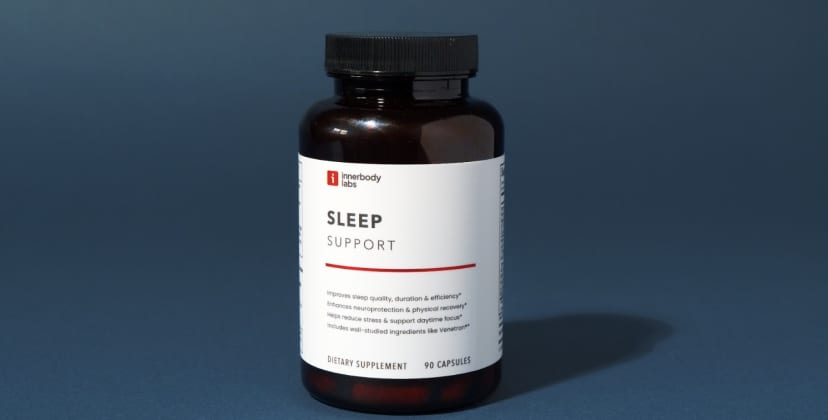When you buy through our links, we may earn a commission. Products or services may be offered by an affiliated entity. Learn more.
Best Magnesium Supplements for Sleep of 2026
Our Experts Weigh In
Magnesium is a mineral that helps your body perform hundreds of different tasks. The body gets magnesium from foods like leafy greens and nuts, though some people boost their magnesium levels by taking supplements. Magnesium’s muscle- and nerve-relaxing benefits may be helpful for improving sleep quality. We’ll cover our top picks for magnesium supplements that can help improve your sleep.
Magnesium is quickly becoming one of the most popular sleep aids available today. Experts are still investigating the link between this naturally occurring mineral and sleep, as there is no conclusive evidence yet to prove exactly how or why many people report better sleep after taking magnesium supplements.
Though we don’t yet understand magnesium’s effects on sleep, it’s a supplement that many people can take safely and one that can help your body function more effectively. We’ll cover our top magnesium supplement picks for sleep, how magnesium supplements work, and who should take them. We’ll also highlight types of magnesium and what to know before purchasing magnesium as a sleep aid.
The Best Magnesium For Sleep

Best Overall
Momentous Magnesium L-Threonate
Shop Now

Best Melatonin-Free
Innerbody Labs Sleep Support
Shop Now
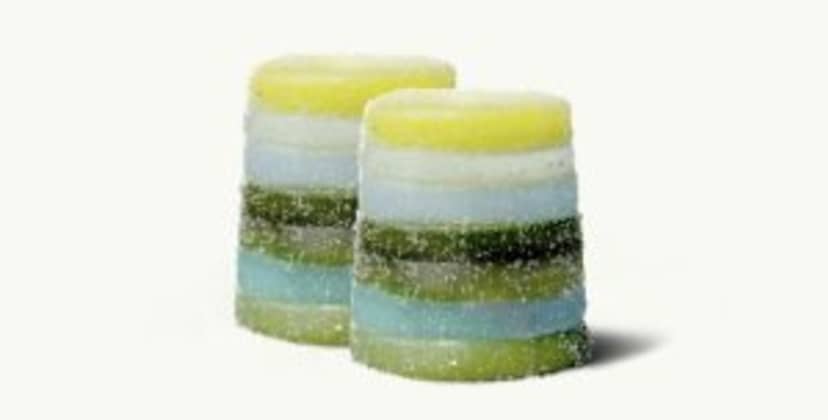
Best Gummies
Elo Sleep Gummies
Shop Now

Best Drink
Ritual Magnesium+
Shop Now

Best Subscription Options
Upgraded 8-Hour Sleep
Shop Now
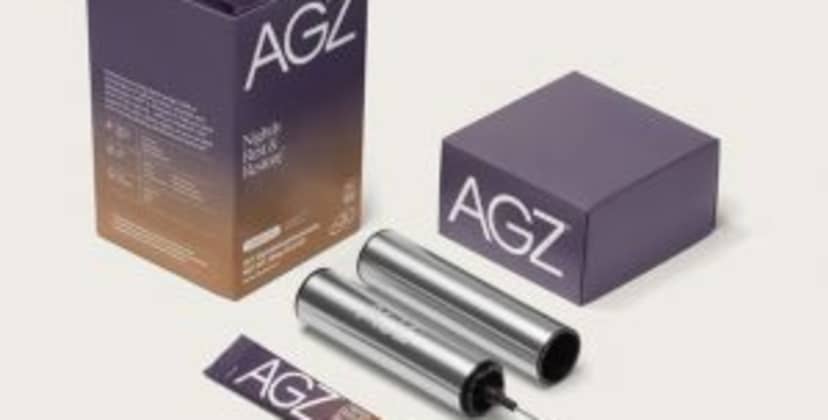
Best Flavor Options
AGZ
Shop Now

Best Vegan
HUM Nutrition Dream Team Magnesium
Shop Now
In-Depth Reviews
Best Overall
Momentous Magnesium L-Threonate
Use this SleepFoundation.org link for the most current discount on Momentous products
Shop Now
The vegan Magnesium L-Threonate from Momentous is a great supplement if your magnesium intake levels are low or deficient. One capsule contains 145 milligrams of magnesium, so you can tailor your dosage accordingly.
Pros
Magnesium L-threonate can improve sleep and boost daytime function
FSA and HSA funds accepted for payment
Subscribers receive a 25% discount
Cons
May not be suitable for people with corn allergies
Daily and nightly dosing can quickly deplete your supply
Price
$50
Milligrams
Serving size: 3 capsules (145mg)
Magnesium L-threonate (MgT) is believed to not only help you fall asleep but also feel well-rested, alert, and functional during the day. People may benefit from this extra boost if they struggle with nightly sleep and the after-effects the following day.
Each vegan capsule contains 145 milligrams of magnesium. You should talk to your doctor before taking these supplements to discuss how many capsules are recommended for your specific needs, but the relatively low dosage allows you to tailor your daily intake accordingly. Each bottle contains 90 capsules, or 30 servings.
While Magnesium L-Threonate is somewhat expensive compared to the competition, Sleep Doctor offers a 15% discount on your purchase if you sign up for a subscription. Standard shipping is free for all orders of $50 or more.
Containing more than 70 ingredients, Sleep Support from Innerbody Labs works to improve your sleep on several levels to help you feel refreshed and well-rested each morning. The vegan-friendly formulation does not include melatonin, GMOs, or gluten, and subscription options are available for long-term users.
Pros
Comprehensive formulation includes more than 70 ingredients
Vegan and free of GMOs, gluten, and melatonin
Subscription options save you money in the long run
Cons
Not ideal for those seeking a supplement with melatonin
Non-subscription purchases are somewhat expensive
Price
$65
Milligrams
Serving size: 3 capsules (127mg)
Many people take melatonin to relax and prepare for bed, but others find that melatonin supplements leave them tired and groggy in the morning. If you’re in the latter camp, Innerbody Labs’ Sleep Support should provide sleep improvements without using melatonin. The complex vegan formulation includes magnesium, along with zinc and copper to boost your sleep efficiency, vitamin D to promote deeper sleep, and L-theanine to help you fall asleep more quickly.
Key botanicals are another essential part of Sleep Support. Natural sleep aids such as saffron, lemon balm, and ashwagandha help relieve stress, calm your mind, and prepare you for a full night’s rest. Each serving consists of three capsules, which collectively contain 127 milligrams of melatonin. Your purchase includes a month’s supply of capsules. The supplement is vegan, and does not include any GMOs or gluten.
You can opt for a one-time purchase, or sign up for a one-, three-, or six-month subscription with Innerbody Labs and save up to 25% in the long term if you foresee ongoing sleep supplement needs. Standard ground shipping is free for all U.S. orders, and unopened returns are accepted within 30 days of the delivery date.
Best Gummies
Elo Sleep Gummies
Use this SleepFoundation.org link for the most current discount on Elo products
Shop Now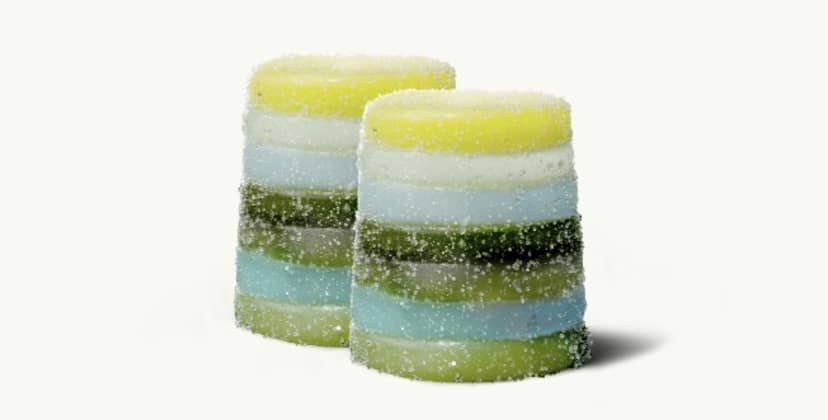
The Elo Sleep Gummies contain magnesium, melatonin, L-theanine, ashwagandha, and tart cherry juice extract – all of which promote healthy, restful sleep in their own way. A mixed berry flavor masks the ingredients, and the chewable capsules may be easier for some people to chew and swallow.
Pros
Chewable gummies are gentle on your teeth and easy to digest
Delicious mixed berry flavor
Monthly subscription option for those with long-term supplement needs
Cons
Gummies may be smooshed in transit
Sticker price is expensive without the subscription
Price
$69
Milligrams
Serving size: 2 gummies (105mg)
When it comes to nightly supplements, many people prefer softer chewable gummies over capsules or lozenges. The Elo Sleep Gummies have a complex, layered mixed berry taste that provides an enticing flavor profile while also helping to improve your sleep. Other ingredients include melatonin, magnesium, L-theanine, ashwagandha, and tart cherry juice extract – all natural sleep aids.
One serving consists of two gummies with 105 milligrams of magnesium, 2 milligrams of melatonin, and 100 milligrams of L-theanine. For many, this is the ideal combo to promote relaxation and restorative sleep without feelings of grogginess in the morning. Each container includes 28 servings.
You can opt for a one-time purchase with Elo or sign up for a monthly subscription, which cuts roughly 30% off the sticker price. Ground shipping is free for shoppers in the U.S., and you can pause or cancel your subscription at any time.
Best Drink
Ritual Magnesium+
Use this SleepFoundation.org link for the most current discount on Ritual products
Shop Now
Ritual Magnesium+ is ideal for anyone who prefers drinkable magnesium supplements. A powder mix of magnesium and tart cherry extract masked with strawberry and raspberry flavor lets you enjoy a pleasant beverage before bed and sleep better during the night.
Pros
Tart cherry extract and magnesium work in tandem to help you sleep better
Powder mixes easily into water for a refreshing nighttime drink
Gluten-free, soy-free, and vegan-friendly
Cons
Heavy stirring required to mix the beverage
Some people dislike the flavor and note a bitter aftertaste
Price
$50
Milligrams
Serving size: 2 teaspoons (300mg)
Everyone has their preferred type of supplement. If you’re partial to drink mixes, Ritual Magnesium+ delivers the goods with a powder-based supplement containing magnesium and tart cherry extract. Both ingredients can improve your overall sleep quality and aid with muscle recovery during the night to soothe aches and sore spots.
The mix contains magnesium bisglycinate chelate, which is thought to be easier on the stomach and ease symptoms of gastrointestinal conditions. Strawberry and raspberry juices are used to make the supplement more palatable. Some users report a bitter aftertaste, but most say they don’t mind – or even enjoy – the flavor. One serving is roughly two teaspoons and contains 300mg of magnesium. If this makes your daily intake too high, a half-serving with 150mg of magnesium should suffice.
Ritual Magnesium+ is competitively priced. When you purchase your first order, you’ll automatically be enrolled in a monthly subscription and billed before your next shipment arrives. You can opt out of the subscription at any time without penalty fees. Standard ground shipping is free of charge.
Best Subscription Options
Upgraded 8-Hour Sleep
Use this SleepFoundation.org link for the most current discount on Upgraded Formulas products
Shop Now
Upgraded 8-Hour Sleep is a no-frills magnesium supplement with no extra ingredients or flavoring components. The per-capsule price is a steal, and shoppers can choose from a wide range of subscription options for extra savings.
Pros
Melatonin-free for those seeking a dedicated magnesium supplement
Great price-per-capsule value
Generous subscription options include substantial discounts
Cons
Non-flavored capsule may be unpleasant to swallow
Some people will need to parse out the standard dose
Price
$70
Milligrams
Serving size: 4 capsules (470mg)
If you take magnesium on a regular basis and want to sign up for an ongoing subscription, Upgraded Formulas makes this process easy with the 8-Hour Sleep supplement. You can opt to receive a new container of supplements every month, 45 days, two months, or three months. Each option includes a generous 40% discount on your initial purchase.
Your container comes with 120 capsules. At roughly 65 cents per pill, these supplements offer great long-term value — even if the sticker price looks high at first glance. A standard dose consists of 470mg divided into four pills. Since this dosage exceeds the daily nutritional value (DNV) for most adults, you may find that two or three capsules provide enough magnesium. Always talk to your doctor before taking a supplement with a standard dose higher than DNV recommendations.
The capsules are not flavored, so they may taste bitter going down, but drinking a full glass of water with each dose can temper any unpleasantness. All orders in the contiguous U.S. Those who are not absolutely satisfied with their purchase will receive a full refund if they reach out to Upgraded Formulas within 60 days of their first order.
Best Flavor Options
AGZ
Use this SleepFoundation.org link for the most current discount on AGZ products
Shop Now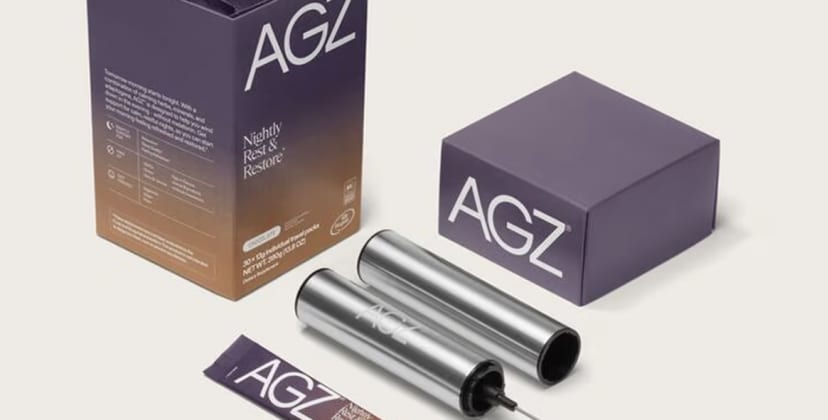
Vegan, melatonin-free AGZ harnesses the sleep-inducing abilities of magnesium, ashwagandha, valerian, and other soporific ingredients. Simply stir the packet mix with water or milk to concoct a tasty bedtime beverage that helps you feel tired, fall asleep quickly, and feel refreshed the next day.
Pros
Drink mix contains magnesium L-threonate, saffron, ashwagandha, L-theanine, and valerian
Beverage is free of melatonin for those who want to avoid it
Chocolate, mint, and berry flavor options
Cons
Extra steps needed to prepare the drink
More expensive than the average magnesium supplement
Price
$40
Milligrams
Serving size: 1 packet (250mg)
A common complaint about magnesium for sleep is taste – if other flavors aren’t present to mask the bitterness, these supplements can be hard to swallow in the most literal sense. AGZ is a powder mix that comes in chocolate, mint, and mixed berry varieties. All three are subtle yet effective at creating a palatable flavor profile, but the long list of sleep-inducing ingredients also makes the mix a solid nighttime solution for better sleep.
Each serving comes in an individual packet. In addition to 250mg of magnesium L-threonate, the mix contains other soporifics like valerian root, ashwagandha, saffron, and L-theonine. Simply open the mix packet and empty the contents into a glass, followed by 4 ounces of water or milk. Using the AGZ frother included with your purchase, you can blend the drink until it’s thoroughly mixed. You may enjoy the drink at a warm or cold temperature.
In addition to the frother, each order includes either 13 or 30 serving packets. At roughly $2.60 per serving, AGZ is a bit more expensive than the average magnesium supplement, but the pleasant taste may be worth the extra money if you’ve struggled with non-flavored magnesium in the past. Orders of the larger shipment qualify for a 20% discount when you sign up for a monthly subscription.
Best Vegan
HUM Nutrition Dream Team Magnesium
Use this SleepFoundation.org link for the most current discount on HUM Nutrition products
Shop Now
If you’re vegan, the HUM Dream Team Magnesium is an effective sleep supplement that won’t interfere with your dietary practices. Magnesium, L-theanine, and tart cherry extract combine to help you unwind before bed, fall asleep quickly, and get the restorative sleep you need throughout the night.
Pros
Soothing blend of magnesium, L-theanine, and tart cherry extract
Quick-acting formulation takes effect within an hour
Recipe is gluten-free and vegan-friendly
Cons
Some people may need a smaller dose than the recommended serving
Those sensitive to sweet flavors may dislike the taste
Price
$30
Milligrams
Serving size: 1 teaspoon (325mg)
Most magnesium supplements are vegan-friendly, but HUM’s Dream Team Magnesium stands out from much of the competition thanks because it has a pleasant cherry-lemon taste and is easy on your digestive system. This powder mix contains 325mg of magnesium in the recommended serving, which is 77% of your daily value – some people may only need half a dose to reach healthy daily intake levels.
In addition to magnesium bisglycinate chelate, the supplement also contains two other sleep-inducing ingredients. Tart cherry extract helps you relax and unwind before bed, while L-theanine promotes deep, restorative sleep throughout the night. Beet powder and turmeric powder are used for color. You should notice the supplement’s effects within 45 minutes of ingestion, so be sure to time your dose based on your normal sleep schedule.
Each container includes 30 servings. If you sign up for a monthly subscription when you purchase your first shipment, you’ll save 20% on the total cost. Subscribers also qualify for free samples.
Why You Should Trust Us
At Sleep Foundation, we aim to provide our readers with current, accurate information that helps improve sleep quality and comfort. Our team has decades of combined experience researching sleep products. We stay current with new formulations and make adjustments when needed so that we can provide the most relevant data possible.
When it comes to sleep aids, it’s important to know exactly what ingredients are present and how they work to better your sleep. Our testing team has spent years developing a comprehensive understanding of how different sleep aids work, and we use that experience to determine our top picks so that you can find the best option for your needs.
How to Choose Magnesium for Sleep
Since there are multiple types of magnesium, there are a few factors to consider when buying a supplement specifically for sleep. First, ensure that taking a magnesium sleep aid is safe for your body, then you should reflect on how much magnesium you take in from foods. Understanding how much magnesium you lack can help you find a supplement with a dosage that works for your individual needs.
What to Consider When Purchasing Magnesium Supplements
In addition to magnesium type and dosage, there are a handful of other aspects to keep in mind when purchasing magnesium supplements. Many supplements include other active ingredients that you may or may not need. There are also multiple delivery methods, including capsules, softgels, drink powders, sprays, and topicals.
Consider what you’re looking for in a magnesium supplement, then find an option that meets your requirements. Some marketing language can be misleading, so be sure to check that the product has the specifications you want. Your personal needs are most important when shopping for magnesium supplements.
Magnesium Content
Check to see what type of magnesium your supplement contains. Magnesium glycinate and citrate are both widely available in sleep aids, while magnesium oxide and chloride are often used to relieve constipation and heartburn. Most supplements detail exactly what type of magnesium they contain.
Other Active Ingredients
Some magnesium supplements strictly contain magnesium, while others have additional active ingredients. If you’re shopping for a sleep aid, you may see added ingredients like L-theanine, melatonin, gamma-aminobutyric (GABA), or tryptophan, which are all thought to help promote better sleep.
Brand Reputation
While supplements aren’t regulated by the U.S. Food and Drug Administration (FDA), there are plenty of manufacturers that perform third-party testing and have excellent reputations. Purchasing from brands with a reputation for high-quality products is an excellent way to ensure you’re getting a top-notch supplement.
Value
Magnesium is relatively inexpensive. One dose can cost anywhere between 10 cents and $2. Keep in mind that added active ingredients, branding, certifications, and shipping can all increase overall cost. Some companies also offer subscription options that help reduce costs.
Your intended dose can also affect price. If you plan on taking more than one serving, be sure to factor the added cost into your budget.
Which Type of Magnesium Supplement Should I Choose?
You can find magnesium supplements in a range of different delivery methods, including capsules, chewables, drink mixes, and sprays. After deciding on the type of magnesium and dosage option, sleepers have several options for finding a supplement type that fits their needs.
- Capsules: Capsules are the most common type of magnesium supplement on the market. They’re easy to digest, inexpensive to produce, and often vegan and gluten-free. Since capsules are one of the easiest ways for companies to package magnesium, you can find many types of consumable magnesium and other active ingredients in capsule form.
- Gummies: People who have a tough time swallowing pills may prefer gummy magnesium supplements. Since the magnesium has to be bound together into a gel form, gummies typically have added ingredients to give them their distinct texture. They may also have added flavors to enhance their taste. Some gummy supplements are also vegan or gluten-free.
- Drink mix: A magnesium drink mix supplement is one of the easiest ways to get an exact dose. You can adjust how much powder you mix with water to increase or decrease your dose as needed. Magnesium drink mixes can also contain other active ingredients and typically come in a range of flavors.
- Spray: Sprays are a unique way to deliver magnesium to your body. Some are designed to be applied to the feet, while others don’t specify where they should be sprayed. If you have a sensitive stomach, a spray magnesium supplement is an excellent way to avoid gastrointestinal side effects. However, some experts suggest that further research is needed, as using topical magnesium may not be as effective as ingesting it.
- Lozenges: Magnesium supplement lozenges are an excellent choice for people who want to avoid taking pills. Lozenges are fast-acting and can be formulated to contain multiple magnesium types and active ingredients. They typically have added flavoring.
- Magnesium blends: If you’re shopping for a magnesium-based sleep aid, you’re likely to encounter supplements with added ingredients. Blending magnesium with active ingredients like melatonin, L-theanine, and GABA may help increase sleep quality and adherence. Though these substances are generally safe for consumption, you may want to check with your doctor before taking blended supplements. These added ingredients may have side effects such as headache, sleepiness, or upset stomach.
How Does Magnesium Help You Sleep?
Magnesium is a mineral that helps your body perform critical tasks like nervous system and blood sugar regulation, protein creation, and muscle function. It’s also been shown to help regulate your circadian rhythm, also known as your body’s internal clock. Though experts are still investigating the exact relationship between magnesium and sleep, studies indicate that there is a connection between a lack of magnesium and insomnia.
Magnesium doesn’t have the proven track record that other sleep aids like benzodiazepine medications, melatonin, and certain antidepressants have. However, it’s non-habit forming, easily accessible, and safe for most adults to take regularly. Scientists believe that magnesium increases sleep quality and length by calming your muscles and nervous system, though so far studies have only been done on older adults.
There are a few different forms of magnesium available as dietary supplements. Many sleep aids and daily supplements include magnesium glycinate and citrate. The body absorbs these two types easily, and they are typically gentle on the digestive system.
While overdosing any type of magnesium can cause gastrointestinal issues, magnesium glycinate and citrate have a much milder laxative effect than other kinds such as magnesium oxide and chloride.
How Much Magnesium Should You Take for Sleep?
According to the National Institutes of Health Office of Dietary Supplements and the National Library of Medicine, the total magnesium intake recommended for adults is between 310 and 420 milligrams, depending on an individual’s age, sex, and whether they are pregnant. The Recommended Dietary Allowance (RDA) for teens aged 14 to 18 is between 360 and 410 milligrams.
For children, the recommended daily intake is 30 milligrams from birth to 6 months, 75 milligrams from 7 to 12 months, 80 milligrams from ages 1 to 3, 130 milligrams from ages 4 to 8, and 240 milligrams from ages 9 to 13. Recommendations account for magnesium that your body takes in naturally through foods like pumpkin seeds, spinach, and whole grains, which are naturally rich in magnesium.
Though exceeding the RDA for magnesium isn’t life-threatening for most people, overdosing can result in diarrhea, headache, and low blood pressure among other issues. People with renal problems, colitis, and certain other absorption-related conditions may be more at risk for serious side effects.
If you experience any unusual or uncomfortable side effects while taking magnesium supplements, make sure to contact your health care provider. Always check with your physician before introducing a new sleep aid to your routine.
What Is the Difference Between Magnesium and Melatonin?
Though both melatonin and magnesium are popular natural sleep aids, they promote better sleep in different ways. Melatonin is a hormone that your body produces naturally when it’s time to fall asleep. The body begins producing melatonin as darkness approaches, helping to ease you into sleep. Taking melatonin supplements may help certain people fall asleep easier.
Your body doesn’t produce magnesium, rather it absorbs magnesium that’s present in specific foods. Magnesium is an electrolyte that encourages bodily homeostasis and aids in more than 300 essential functions. As a sleep aid, experts believe that magnesium helps your body’s circadian rhythm by regulating the nervous system and relaxing your muscles.
Though neither supplement is habit-forming or addictive, you should still be aware of dosages, as both can produce mild side effects. Too much magnesium can cause stomach issues and may be dangerous for people with kidney problems. Melatonin may cause headaches and sleepiness in certain users. Some supplements contain both magnesium and melatonin as active ingredients, which is considered safe, as they have no known adverse reactions when combined.

Still have questions? Ask our community!
Join our Sleep Care Community — a trusted hub of sleep health professionals, product specialists, and people just like you. Whether you need expert sleep advice for your insomnia or you’re searching for the perfect mattress, we’ve got you covered. Get personalized guidance from the experts who know sleep best.

